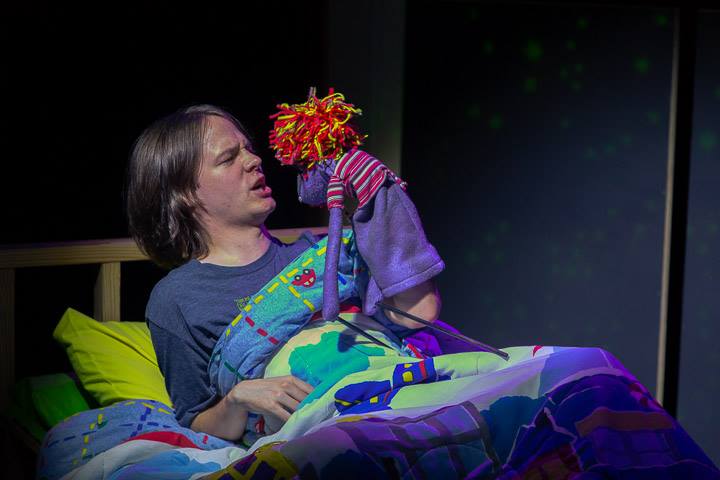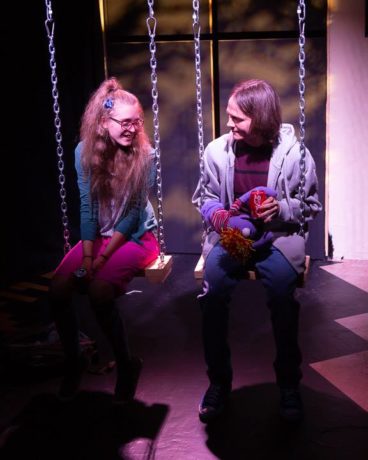So what sort of play is Hand to God? Dysfunctional family drama? Teen coping with angst saga? Angry satire on a particular style of Christianity? Scenario for a horror movie? Raunchy sex comedy? Showcase of virtuoso puppetry? All these elements coexist, not always peacefully, in Robert Askins’ script, now playing at the Maryland Ensemble Theatre in Frederick.

Puppetry is the show’s signature. Designed by Lee Hebb, coached by Vanessa Strickland, and manipulated principally by Kevin Cole (who plays unhappy teen Jason), the all-too-animate puppet Tyrone (named after the dysfunctional family in Long Day’s Journey Into Night) is the show’s most compelling character. The profane expression of the mild-mannered Jason’s uncontrolled, raging, teenage id, Tyrone curses, yells, threatens, intimidates, seduces, and physically attacks other characters. His self-image is that of the devil himself. Like anyone in a position of power with an uncontrolled, raging id, he is dangerous, capable of inflicting and provoking violence.
Cole does a marvelous job, not only of manipulating the puppet physically but in switching quickly back and forth between Jason’s higher, more tentative voice, and Tyrone’s lower-pitched growl. Playing two characters (or two manifestations of the same character, if you will) is no easy task, and Cole is more than up to it.
The other significant puppet character is Jolene, created by Jessica (Lauren Johnson), a sweet teenager who shares a crush with Jason. When Jessica brings Jolene to the fray in the second act, it sets the stage for one of the evening’s funniest moments, an R-rated episode that surpasses the more wholesome puppet erotic adventure in Avenue Q.
Jason’s family is dysfunctional and angst-ridden. His father recently died, apparently of overeating, and his mother, Margery (Lia Seltzer), a woman well beyond the verge of a nervous breakdown and with a penchant for rough sex, is nearly always out of control. She begins at a high decibel level of anxious intensity and mostly stays there. Starting a bit more quietly, with the desperation visible but kept just barely beneath the surface, might have given the characterization a greater opportunity to grow and vary.
The most ambiguous character is Greg (Thom Huenger), the pastor of the not-too-prosperous church in which Margery and the teenage characters participate in a puppet ministry. We first see him in a cringe-worthy, smarmy attempt to romance Margery. In the second act, he appears genuinely, even if unavailingly, attempting to help other characters through their emotional difficulties. Askins does not provide a clear path between these differing aspects of the character for the actor to work with.

If there is merit to the old line that a teenage boy has two brains, only one of which can operate at a time, then the brain Timothy (Steve Custer) engages is clearly the more southerly of the two. He wants only one thing, and finds it in a hilarious scene for which director Tad Janes deserves high marks for fight and intimacy choreography. Following an assault by Tyrone in the second act and a confrontation with Greg, Timothy disappears from the play.
The technical aspects of the production are well executed. The stage left side of Matt Vance’s set is a convincing reproduction of a church basement, complete with pious posters and cheap furniture, notably two egregious blue beanbag chairs. The stage right space serves a variety of functions, particularly Pastor Greg’s study in Act 2. Some of the set changes slow the play’s pace at times. This is a props-heavy show, and designer Tabetha White provides a nice collection of Bibles, plastic buckets, pictures, bookcases, etc., many of which suffer damage from the characters’ emotional wildness. Stage blood is used effectively for three characters.
The lighting design (Doug Grove) separates the right and left playing areas well, and changes to dramatic red when Tyrone is at his most devilish. There is a nice effect when Tyrone puts out one of the lights in the church basement. Director Janes created the eclectic sound design, using music ranging from Sunday school songs to Christian pop to classical and opera (Tyrone is first introduced with a Copland fanfare, for example). Smaller effects, such as a car door closing sound when Jason gets out of Margery’s car, are well coordinated with the action.
The playwright has commented that he is most comfortable working with “anarchic rage,” “lethal perversity,” and “sex, blood, and Jesus,” all of which feature prominently in Hand to God. Some of the background of the show is autobiographical. Askins’ mother ran a Christian puppet ministry in a Missouri Synod Lutheran church in Texas, his father died when he was a teenager, and he was a difficult kid. In a 2017 interview, he said “A lot of my emotions were not expressed, which is part of the reason I think it came out in other behaviors. I wasn’t able to say to people, ‘I am hurting. This really feels bad.’ So some people who knew me during that period of time, when they see the play, they don’t see a comedy. They just see this [messed-up] kid acting out.”
An audience can relate to the play’s over-the-top humor and human connection to the struggles of a troubled young man. The meaning of Tyrone remains the source of the play’s greatest fascination, however. Tyrone opens and closes the show as a foul-mouthed lecturer on the history and sociology of religion. Is he speaking for the playwright? Might he also be a kind of external demonic force as well as the voice of Jason’s anger, grief, and frustration? Askins, probably wisely, refrains from providing easy answers.
Running Time: One hour and 50 minutes, including one intermission.
Hand to God plays at the Maryland Ensemble Theatre, 31 W. Patrick St., Frederick MD, through September 30. For tickets, call the theater at 301-694-4744 or go online.




